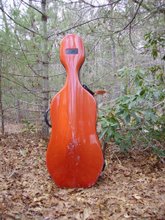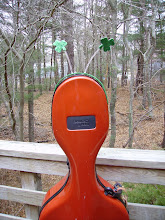I finally finished Suzuki Book Three. Yes, it has taken me years, in part because my teacher not only insists on my memorizing each piece, but also my performing, from memory, all the pieces in each book with a pianist (at the same recital) before moving onto the next book. And memory means the ability to start at any point in a piece, know all the notes, etc., not just play it by rote. Memory is the first step in learning a piece; after that, you polish and refine. This is the way she teaches her young students, and it is the way she teachers her older ones. One is supposed to keep all previous pieces current, and I try.
It is difficult for me, all this memorization, but
not memorizing is not an option with my teacher. On the one hand, I do think I learn the music better than someone who learns a piece and moves on, never to play it again. I think I am probably better off than people who skip around, or skip quickly through the books, not remembering earlier technique. It's not a race, I say, to reassure myself.
On the other hand, sometimes I think 98 percent of my mental powers and practice efforts go into memorization, and other crucial things about playing the cello, say intonation or vibrato, do not always get the attention they deserve. So, I tend to define success as "getting through the piece," not playing it musically.
Other factors conspire to slow my progress. I play two instruments and have limited time to practice; I play in numerous ensembles playing widely different types of music; I have big recitals, not just the pieces in the Suzuki books, but numerous ensemble pieces so that I can also perform friends (and so they can enjoy being part of the recital, not just suffer through my performances).
The memory thing, for me, has its pros and cons. I do like being able to play pieces from memory, not only the Suzuki pieces, but also fiddle tunes and other music, and my memory capacity much better than it used to be. But, memorizing can be very frustrating for me, and sometimes I feel that my head can only hold a certain amount of music memory (a lot more now than when I started, but still a finite amount), and trying to perfect one phrase causes another one to escape. I had a difficult time getting all the pieces in Book 3 to stay in my head at the same time, so I finally split the pieces into two recitals.
So, to get to the point of this post, I am delighted to say I don't have to memorize the Breval Sonata (because it is a sonata, not because it might be helpful for me to try to learn a piece before memorizing it, rather than the other way around). And, after a week with it, I am thrilled at my progress. The old (memorization) way, I would be two lines into it by now. But I am playing it straight through, with my teacher accompanying (sounds good that way). There are still parts to smooth out, and I have to get it up to tempo, but gosh, this is a nice change of pace.
I have to admit I never cared for the Breval until I started playing it, but was determined to learn it because it is often selected as the junior (grades 7 to 9) audition piece for state orchestra competitions. I do enjoy it now, and I am so delight to be finally playing, somewhat musically, at the 7th grade level (if not quite yet at the winning-the-audition level).















